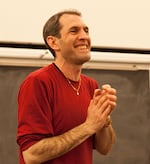Despite the disruptions and chaos it brought with it, Todd Duncan used the pandemic as an opportunity to fundamentally change the way he teaches.
“Suddenly we had to pivot really quickly and really dramatically and somewhat stressfully,” said Duncan, a physics professor at Pacific University. “It was challenging, and it felt to me as if by being forced to make changes, it also gave us permission to make changes that otherwise would have just been too big.”
Similar to other universities, the start of the pandemic propelled students and instructors at Pacific into remote learning. For professors like Duncan: “It was an opportunity to shake things up.”

Todd Duncan, a physics professor at Pacific, used the pandemic as a chance to change the way he teaches his classes. He says students have become more engaged as a result.
Courtesy of Todd Duncan
The increased reliance on technology brought challenges and benefits with it. Professors and administrators worried about students having more opportunity and temptation to cheat — but it also opened the door to question how they’d been running their classes.
“I needed some way to let them do the exams from wherever they were but also protect against cheating,” he said. “I couldn’t do the normal, ‘Calculate this’ … not that we don’t trust the students, but you know, there’s just that pressure, right? I mean, you could easily just look it up.”
Students at Pacific acknowledge that cheating was technically easier than it had ever been when the pandemic started, when most assignments were open book and there was less supervision from professors while taking classes at home.
So Duncan moved away from big exams, something he had been thinking about doing for a while but was forced to do under the circumstances of the pandemic and the switch to remote learning.
Now, he prompts students to find a problem or question they’ve come across in the world, and figure out how to solve it using physics.
Students created physics problems based on the sports they play, such as measuring the motion behind spiking a volleyball. They’ve also written up hypotheticals about their pets, such as calculating the energy of a dog trotting on a treadmill to power household appliances.
“I tried to get them to take something that they care about outside of physics and then realize that, ‘Oh, physics applies to that,’” he said.
Duncan said he began to see his students becoming more engaged, even the ones taking his introductory physics classes as prerequisites for their majors.
“If what I really want is for students to know how to apply the physics to their everyday life, rather than having all these complicated assignments that do different things, let’s just apply the physics to their everyday life,” he said.
Duncan said since he’s done away with in-class exams and focused on projects that are more personal to students, his classes have been more engaging. And when students are more excited about what they’re learning, he says there’s less interest in cheating in the first place. Students agree.
New technology spurs questions around cheating
Lane Johnson is a junior at Pacific and managing editor of the university’s student newspaper — the Pacific Index. He recently wrote a piece about ChatGPT — the artificial intelligence program that some worry could encourage students to plagiarize.
Apps like ChatGPT don’t have the functionality to think critically.
In Johnson’s eyes, that technology is only problematic if professors aren’t giving students assignments that require those critical thinking skills. Johnson said professors shouldn’t be giving such assignments anyway.
“If it’s not requiring you to synthesize information in any way, you’re not actually required to critically connect what you’ve learned … if it’s not doing that, there’s no point to it at all,” Johnson said. “So, then, yeah. Of course they’re going to cheat, because why would they want to spend two hours when they could spend half an hour?”
Johnson said for now, he’s heard more about ChatGPT and other AI technologies from college administrators than he has from students.
Al Weiss, founding director of Pacific’s Center for Education Technology and Curricular Innovation, confirmed to OPB those conversations are starting to float around.
Along with supporting some of Pacific’s technology, like Zoom and its learning management system Moodle, Weiss’ center also hosts faculty workshops and other learning opportunities about new technologies and strategies in teaching and learning. Physics professor Duncan recently gave a presentation through the center to other faculty on his move away from in-class exams.
Weiss said the quick pivot toward technology in 2020 did help some professors, like Duncan, rethink their classrooms.
But, new technologies like ChatGPT are requiring professors to continue adjusting. Weiss said one of the solutions he’s heard educators talk about is bringing back in-class, timed essays, instead of letting students do writing assignments at home, in order to quell any potential cheating.
“We have seen a couple of professors say like, ‘OK, I don’t want you using ChatGPT or other resources, so we’re going to ask you to write this essay right here. Let me see what you do,’” he said. “It might be one of the consequences of the AI change that’s coming.”
Some students hope that’s not the case.

Lane Johnson (left) and Emily Rutkowski (right) are student journalists at Pacific University. They hope professors will keep flexibility and grace when it comes to how students learn, instead of just going back to how things were pre-pandemic.
Meerah Powell / OPB
Emily Rutkowski works with Johnson at the Pacific Index as the paper’s editor-in-chief. She’s a senior at Pacific.
Rutkowski said she was used to taking timed, pen-and-paper exams and essays before the pandemic. Now, not so much.
“I had a professor when I was a freshman and I took a lot of pencil and paper exams, and I didn’t have a problem until last semester, when I was given the exact same exam, paper and pencil, and I didn’t even finish on time. I had three more questions and the class was done,” she said. “I think it’s because with COVID you had so much more time to get your thoughts together, and now that I saw a clock sitting in front of me, I just felt instantly rushed and just trying to write down whatever I thought made sense. The quality was bad.”
Rutkowski’s experience is a reminder that the last three years under the pandemic’s influence hasn’t just introduced technology and changed how professors and institutions operate. Students’ habits and preferences have shifted, too. Rutkowski and Johnson recommend more flexibility and grace when it comes to how students learn, instead of just going back to how things were before the pandemic.
Flipping the classroom on its head
Weiss, with Pacific’s Center for Education Technology and Curricular Innovation, said the start of the pandemic “was a massive, forced, professional development opportunity.”
Graduate psychology professor Jennifer Antick said the switch to remote learning at the start of the pandemic was rough — for both her and her students.
“It’s a pretty miserable experience to sit in Zoom and listen to a lecture,” Antick said.
At the time, Antick had just hit two decades of teaching, most of that in a very traditional way — what she calls being a “sage on the stage”: lecturing in front of her class, sending students home with assignments and measuring their success mainly with exams.
Antick’s classroom doesn’t look like that anymore.
On a Wednesday afternoon at Pacific’s Hillsboro campus in one of Antick’s health psychology classes, the classroom is abuzz with conversation. Students are bouncing ideas off of each other and using class time for discussion and critical thinking exercises. Antick walks between the tables to chat with students as they work.

Jennifer Antick (standing) chats with graduate students in one of her psychology classes using a "flipped classroom" model on Wednesday, March 1, 2023, in Hillsboro, Ore.
Meerah Powell / OPB
Antick said she doesn’t lecture from the front of the class anymore. Instead, she records her lectures and students watch them at home, on their own time. They use their class time together for more active exercises.
That model of teaching is called a “flipped classroom,” something she initially learned about through a presentation from the Center for Educational Technology and Curricular Innovation.
Another change Antick said she’s working on is moving toward non-graded quizzes.
“I got rid of some of the very traditional methods for evaluating critical thinking so that I could err on the side of evaluating critical thinking live in the moment,” she said.
Antick said there were times during the first part of the pandemic where she felt like she might want to throw in the towel, but this new method has “reinvigorated” her teaching and students enjoy it more, too.
“It was like, ‘Do I still have something of value to offer here?’” She said, “If I’m facilitating their learning — not, crack open the head, pour the information in and shake — if I’m facilitating their process, then it’s worth continuing a bit longer.”
She said she’s moved on from being a “sage on the stage” to being a “guide on the side,” and she doesn’t have any plans to go back.

